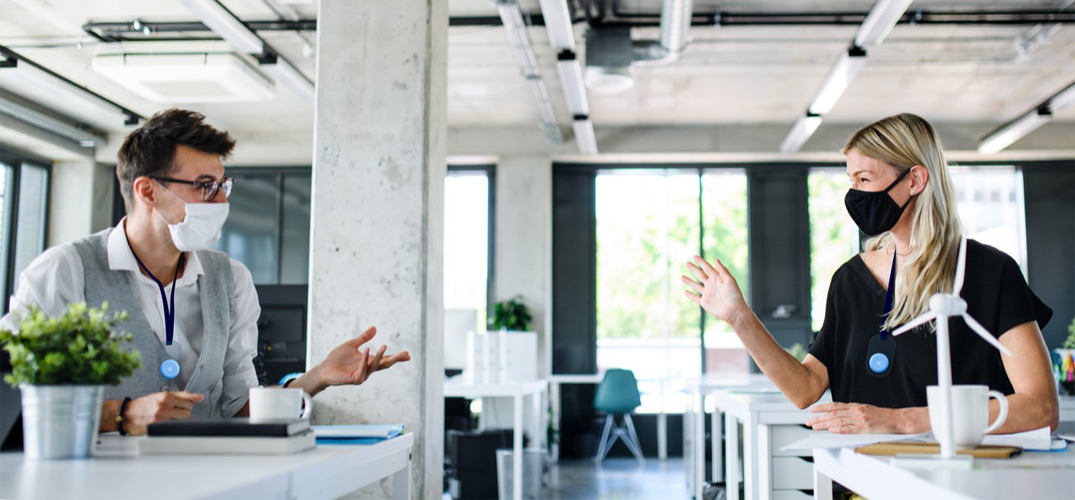
BUBBLE BADGE, EXPONENT OF CREATIVE ROTTERDAM
Initiatief
This transmitter could be the answer for large fairs and events, and for museums and festivals.
Experimental drive and resilience are two concepts that are inextricably linked to Rotterdam. The Rotterdammers rebuilt their city after a devastating bombardment, and still, the building continues. This tangible urge to move forward makes the city attractive to young designers, artists and architects. They feel at home in the city which is never finished and always evolving. Their talent is acknowledged, nurtured and supported in Rotterdam, an approach that results in a flourishing creative sector from which innovative concepts emerge that are as current and relevant as they are practical. Such as Bubble Badge, a transmitter that helps us keep a distance of a metre and a half, invented by Rotterdam’s The Incredible Machine and the Flemish Beyond.io.
The outbreak of corona in the Netherlands meant Voorhaven 57 also came to a halt. The 18th-century building in Delfshaven is normally bustling with renowned artists and designers. The designs that are conceived and developed there go all over the world: to international art and design fairs, to famous museums and other clients. But the fairs were cancelled, museums had to close and clients put all their projects on hold.

The prototype of the Bubble Badge
Marcel Schouwenaar and Harm van Beek of The Incredible Machine also saw their work dry up. They followed the news with a mixture of bewilderment and curiosity. ‘Social distancing, okay. But how?’ As soon as they set foot outside, they saw people struggling with the measures. Schouwenaar: ‘Keeping distance feels unnatural and strange, so it doesn’t always work, even if you want it to.’ The two men, who are used to operating on the interface of design, technology and ethics, went to work on exactly those three areas. ‘Can we use technology to help people keep the 1.5 metres? That was the question we started with,’ said Schouwenaar. ‘It led us to The Social Distance Thing: a laser projector that projects a circle with a radius of one and a half metres around you so that everyone can see when they’re getting too close.’
The designers launched The Social Distance Thing not so much as a serious solution, but as a means to initiate a discussion. It worked: the project received a lot of attention in the national media. Schouwenaar: ‘Then we thought: can’t we design a tool that actually does offer a solution?’ A few weeks later, the Bubble Badge was born: a transmitter that you wear on your clothes and makes a soft sound when you get too close to someone else’s transmitter. It sounds quite simple, but the technology that the duo developed for this is complex: ‘We wanted to be able to accurately measure whether someone is getting too close. After all, it is about safety.’
‘We deliberately opted to not use a beeping sound, but a soft, friendly tone that only the wearer hears.’
The designers see the Bubble Badge explicitly as a tool, not intended to punish people but to help them keep the distance they want to keep. ‘That’s why we deliberately opted to not use a beeping sound, but a soft, friendly tone that only the wearer hears.’ Schouwenaar and Van Beek’s main focus is the event industry: ‘The Bubble Badge could be a solution for major fairs and events, but also for museums and festivals. You no longer have to use ribbons and tape; the transmitters do the work much more discreetly. ‘Bubble Badge is a creative solution for a current problem, and besides being relevant, it’s also easy to apply. An apparently simple, yet ingenious and well-thought-out product with a potential worldwide impact, developed in Rotterdam-West.

The Bubble Badge could be a solution for major fairs and events, but also for museums and festivals.
Relevant and practical
Both Schouwenaar and Van Beek studied at TU Delft. The fact that they established their company in Rotterdam, and not in Eindhoven or Amsterdam, has never been an issue for them. ‘Rotterdam is a great place to grow. When we started, life here was not expensive. Compared to other cities, you could find a very affordable living and working space here. That gave us room to experiment. It’s partly thanks to the small buffer we had saved that we were able to afford to work on The Social Distance Thing and Bubble Badge for two months without pay. That is worth a lot. What also makes Rotterdam attractive,’ said Schouwenaar, ‘is the mix of creatives who settle here. You’ll find designers and artists from Design Academy Eindhoven, TU Delft, the Willem de Kooning Academy and the Grafisch Lyceum. That makes for a lot of fun crossovers, just in our building. If we need an animation, an illustration or a movie, it’s just a matter of popping into someone’s office, and it’s sorted.’
Bubble Badge is now fully developed and has entered the production phase. As the transmitters roll out of the factory, the men of The Incredible Machine are already working on their next project. ‘We’re looking at how we can use tech to develop a responsible way of contact tracing, for example, with a key chain that you can carry in your pocket that stores who you have been in contact with.’ Look forward, keep at it, as the people of Rotterdam are used to.
‘It led us to The Social Distance Thing: a laser projector that projects a circle with a radius of one and a half metres around you so that everyone can see when they’re getting too close.’
Text: Elsbeth Grievink
